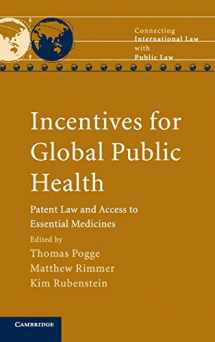
Incentives for Global Public Health: Patent Law and Access to Essential Medicines (Connecting International Law with Public Law)
Book details
Summary
Description
This portrait of the global debate over patent law and access to essential medicines focuses on public health concerns about HIV/AIDS, malaria, tuberculosis, the SARS virus, influenza, and diseases of poverty. The essays explore the diplomatic negotiations and disputes in key international fora, such as the World Trade Organization, the World Health Organization and the World Intellectual Property Organization. Drawing upon international trade law, innovation policy, intellectual property law, health law, human rights and philosophy, the authors seek to canvass policy solutions which encourage and reward worthwhile pharmaceutical innovation while ensuring affordable access to advanced medicines. A number of creative policy options are critically assessed, including the development of a Health Impact Fund, prizes for medical innovation, the use of patent pools, open-source drug development and forms of 'creative capitalism'.


We would LOVE it if you could help us and other readers by reviewing the book
Book review



